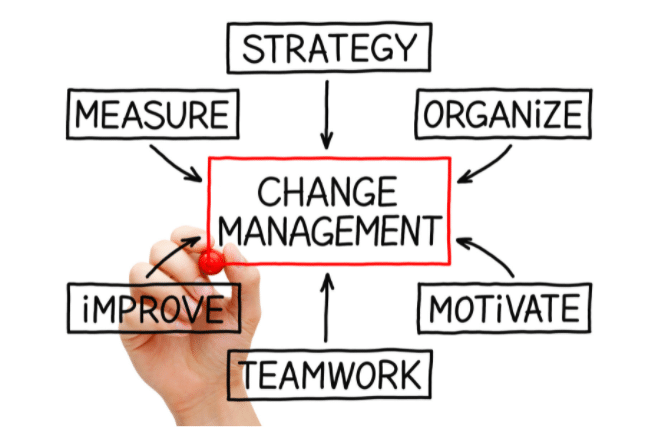At some point, every business will undergo a transition or change. Whether you’re onboarding a new employee or implementing an ERP system, changes will have a significant impact on the course of your business. It’s a requirement for growth.
Unfortunately, organizational change isn’t always easy and is the biggest hurdle in ERP implementations.
A successful change management plan will keep your mission and vision in mind. It’s important to know where your business stands and where your business wants to go. The roadmap for change is just as important as the execution of change.
Complete an initial assessment and designate a future state. The first step in managing change is to know where you are and where you want to go. Complete a full assessment of your organization’s current state and map all business processes. Then document where you’d like your organization to be and optimize processes. Only after comparing the two will you be able to make a business case to executives, managers, and end-users and determine which system will get you from point A to point B as smoothly as possible.
Identify key changes to systems, processes, and organizational structure. Work with department representatives to fully understand potential change impacts from multiple perspectives and for each role and/or area of an organization. Gathering input on the magnitude of impacts will help focus communication and training efforts.
Understand and communicate how roles and responsibilities will change. Incorporate these changes in role impact guides, job descriptions and training materials. By providing these resources before implementation, you can ensure users understand how expectations will be affected. People are also much more likely to buy-into the project if you can answer the “what’s in it for me” question.
Secure Organizational Buy-In. In order for your ERP implementation to be successful, there needs to be complete buy-in from all impacted parties, including decision-makers, managers, and end-users. Including end-users in the decision-making process and making a clear business case to them, as well as managers, will encourage social validation for the project and fast-track adoption efforts.
Develop a training strategy that addresses users transition to the new system and processes. The Training Plan should focus on helping users be more productive using the system and include the who, what, when, and why questions needed for pre- and post-implementation training.
Create a culture that embraces disruptive change. By leveraging disruption and change acceptance as part of your internal culture, your business will set itself up to be a leader of tomorrow rather than an innovation denier. Disruption is an inevitability that your business can better prepare for by building a culture that routinely embraces change because it is a long-term state of being.
Assess successes and failures while holding everyone (including yourself) accountable. A few months after the new system goes-live, revisit the future-state documentation, business case, and expected benefits laid out in the early stages of the project. Monitor process and technology adoption and impact on performance compared to baseline performance measures. Consider the satisfaction of key stakeholders looking for specific comments that can guide future direction. And of course, review costs versus benefits and compare to the expected ROI. The benefits from these systems may initially be hard to quantify but a few areas to look at are process improvements, customer experience, compliance, production, planning and control, procurement, reduced shortages and interruptions, better labor allocation, resource commitment and supervisory oversight and more.

Organizational change management is so important because people are naturally resistant to and intimidated by change. By implementing change management processes, your business will be better equipped to create a lasting positive impact on your employees and business growth.
Our support specialists have years of experience in ERP and are here to help you find your way through organizational change management.
Solutions by Industry
What's New
Optimize Sage 100 with Customization & Cloud
Read MoreSubmitted by Stephanie Dean on Mon, 07/14/25 - 15:13
Outgrowing Your ERP? Why Acumatica is the Upgrade You Need
Read MoreSubmitted by Stephanie Dean on Thu, 06/26/25 - 15:52
Why You Should Make the Switch: NetSuite to Acumatica
Read MoreSubmitted by Stephanie Dean on Tue, 06/17/25 - 13:36